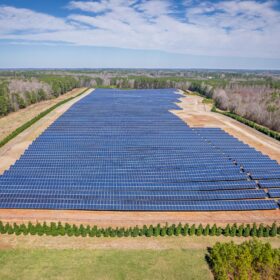Dominion acquires 240 MW-AC of solar in Virginia
The company has reached a deal with local developer Urban Grid to acquire two upcoming projects, which, when complete, should be the largest in the state of Virginia.
SEIA hires John Smirnow, Tony Chen
Trade lawyer and former VP John Smirnow will rejoin the trade group. SEIA has also hired Tony Chen, formerly of SolarCity and Cool Earth Solar.
Saudis may take Tesla private
Elon Musk has revealed that a Saudi sovereign wealth fund has approached him with a definite offer, and has announced advisors as the company forms a special committee.
Fossil interests, utilities spend almost 10x more than renewables industries on lobbying
Drexel University researchers have shown that $2 billion was spent lobbying Congress on climate-related issues between 2000-2016. Electricity utilities, fossil fuel producers and transportation groups dominate the sources of money put into this process.
Florida regulators clear the way for Vivint’s solar lease
Vivint Solar has joined other national residential solar companies in the Florida market as state regulators confirm that their solar lease contract does not violate state law by constituting the sale of electricity.
Nevada PUC chair brings scant energy record
There isn’t much in the way of tea leaves to read regarding Ann Wilkinson, the new appointee to chair of the Public Utilities Commission of Nevada.
The future of California’s grid waits on two bills
Clean energy advocates are trying to move a bill mandating 100% renewable and zero-carbon electricity and a separate bill to clear the way for regionalization of the power grid before the end of the state’s legislative session.
Enphase finalizes purchase of SunPower mincroinverter business
The deal gives SunPower $25 million in cash and 7.5 million shares in Enphase. Enphase also gains access to SunPower microinverter IP, and rights to SunPower’s Equinox AC modules line.
Virginia approves largest solar power plant east of the Rockies
Virginia regulators have approved construction of the four part solar power plant, whose output is partially being sold to Microsoft. The 500 MW-AC facility is being developed by sPower.
I got 99 problems, but a bill of materials isn’t one
DNV GL reveals how important it is that solar power project developers consider the full solar module bill of materials when choosing a product.















